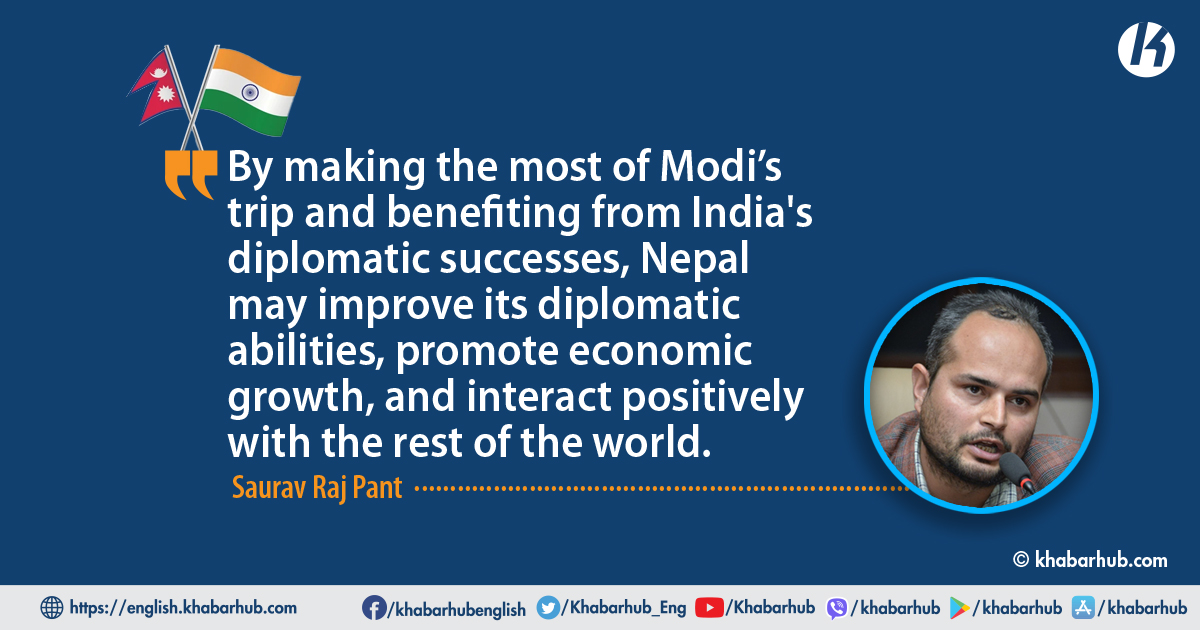The upcoming official state trip to the United States by Indian Prime Minister Narendra Modi (June 21st-June 24th, 2023) is crucial and appropriate for both nations.
The US is aware that it must interact with India apart from its relationship with Pakistan while making use of the Himalayan region’s strategic assets.
In contrast, India wants to strengthen its strategic edge over China, especially given its dominance over the Strait of Malacca.
A growing anti-China attitude has also been exacerbated by the post-COVID-19, which has forced nations like India and the US to reevaluate their relations with China.
In light of this, the visit offers a chance for both nations to deepen their mutual collaboration and align their goals in the face of changing geopolitical threats.
The impending trip by Indian Prime Minister Modi to the US is eagerly awaited since it is projected to eclipse the importance of the 2005 Civil Nuclear Agreement between India and the US, negotiated under the leadership of then-Prime Minister Manmohan Singh.
Examining India’s diplomatic tactics and their relationship to economic growth is now even more important for Nepal in light of Indian Prime Minister Modi’s upcoming trip to the US.
The conclusion of important economic and defense agreements during this visit has a great potential to usher in a new era of bilateral cooperation.
As both nations work to improve their security and technical collaboration, Indian Prime Minister Narendra Modi’s planned trip to the United States is crucial.
Notably, the GE-414 jet engine’s licensed production was announced, and the INDUS X program was launched.
These developments show how committed the military industry is to encouraging collaboration and innovation.
The probable purchase of MQ-9 Reaper armed drones and conversations on intelligence sharing and cooperative military initiatives highlight the depth of cooperation even further.
Shared Interest Vs Shared Values
It is important to stress that Indian experts prefer to frame this upcoming visit in a “shared interest” way rather than only relying on “shared values”.
The vision of a “New India” has developed, fusing Hindutva ideology with India’s amazing economic progress, while the vibrant Indian diasporas in the US has adopted American way of living.
This change emphasizes how crucial it is for the India-United States bilateral partnership to base itself upon mutual interests.
It underlines the Indian government’s commitment to achieve practical collaboration and tangible outcomes in line with its national development goals by acknowledging the dynamic character of this partnership and the unique political, cultural, and historical settings of both countries.
India prioritizes their shared interests while also taking into account the particular ideals and aspirations of the “New India” in order to harness the advantages of both nations’capabilities and expertise.
While common interests are vital, it’s also necessary to keep in mind that values continue to be a major factor in the relationship between India and the United States.
Promoting democratic principles, human rights, and the rule of law has played a significant role in this partnership.
But by emphasizing shared interests, we recognize that the relationship between the two nations extends beyond ideological similarity and takes into account a larger variety of geopolitical, economic, and security issues.
By approaching the visit from the perspective of common interests, India and the United States may forge successful partnerships, address pressing challenges, and make the most of one another’s advantages.
This method provides a realistic and nuanced picture of the connection by taking into consideration the different interactions, such as geopolitics, economics, and social objectives, that have an impact on it.
It is critical for Nepal to understand that while sharing a governance system and cultural links with India, it must take proactive measures to remove bureaucratic flaws.
Finally, by stressing shared interests, the Modi visit to the US offers a chance to strengthen the bilateral relationship even more.
While the American Indian community has embraced American values, India’s unique blend of Hindutva ideology and economic growth has highlighted the importance of shared interests.
Both nations may improve cooperation, achieve their own national interests, and create the road for a healthy and positive bilateral relationship by recognizing this fact and working toward a mutually beneficial engagement.
Learning from India’s state visit to the US
Examining India’s diplomatic tactics and their relationship to economic growth is now even more important for Nepal in light of Indian Prime Minister Modi’s upcoming trip to the US.
Understanding how India has successfully used diplomacy to achieve its economic interests might be helpful for Nepal as it works to increase its global influence and fortify its relationships with major nations.
India has placed a conscious focus on diplomatic engagement as it transitioned from a colonial to a global economic powerhouse.
India has successfully developed diplomatic contacts that have aided in economic growth and development by making use of its connections with other civilizations. This trip to the United States by Indian Prime Minister Modi serves as a reminder of the value of diplomatic engagement in advancing national objectives.
Nepal may benefit from India’s experiences due to its special geopolitical location and historical linkages. The development of India’s bureaucracy, which has been essential in assisting its diplomatic endeavors, is one important factor.
Since India’s bureaucratic structures have evolved and expanded from British Empire, diplomatic actions that support the nation’s economic objectives are effectively coordinated and put into action.
In contrast, Nepal’s administration suffers obstacles and constraints that hinder its capacity to take advantage of diplomatic possibilities.
Nepal can improve its bureaucracy, boost its ability to manage international relations, and foster economic progress by taking lessons from India’s experiences. In order to achieve this, its diplomatic corps will need to embrace best practices, streamline procedures, and develop expertise.
Nepal may learn a lot from India’s successful blending of diplomacy with concurrent economic progress. India’s economic success is largely due to its capacity to draw in foreign capital, establish business alliances, and access international markets.
Nepal can find methods to coordinate its own diplomatic efforts with economic goals, attracting investments, boosting commercial links, and promoting tourism and infrastructure development by carefully scrutinizing India’s diplomatic techniques and strategies.
While similar interests serve as the cornerstone of the US-India relationship, it is important to recognize the contribution that shared values, such as democratic ideals and human rights, have made to the development of this alliance.
It is critical for Nepal to understand that while sharing a governance system and cultural links with India, it must take proactive measures to remove bureaucratic flaws.
By doing this, Nepal may strengthen its diplomatic skills and interact with powerful nations like the United States in a productive manner, opening the path for economic development, stability, and prosperity.
Counterarguments
But other detractor contend that framing the upcoming visit primarily in terms of shared beliefs rather than common interests may undervalue the significance of defending democratic norms and human rights.
The promotion of these principles has been a pillar of the India-United States relationship; if their importance is minimized, the moral basis of the alliance may be jeopardized.
A concentration purely on common interests without taking into account shared values, according to critics, might result in short-term profits at the price of long-term ethical considerations, thereby weakening the credibility and validity of the bilateral partnership.
In addition, there are reservations that Nepal should not merely copy India’s diplomatic policy, despite this articles’ suggestion that it can benefit from its strategic advantages.
According to Detractor, Nepal should have a separate foreign policy that is in line with its interests and goals on account of the country’s particular geopolitical dynamics.
Simply copying India’s diplomatic strategies might restrict Nepal’s diplomacy and make it more difficult for it to have a variety of partnerships with other regional nations.
Nepal must strike a balance between emulating India’s diplomatic achievements and customizing them to fit its own unique situation, making sure that its actions are consistent with its national interests and values.
Way Forward
Both countries would benefit greatly from Indian Prime Minister Narendra Modi’s planned state visit to the US, which will provide a forum for them to further their collaboration and handle evolving geopolitical challenges.
It is expected to be more significant than the Civil Nuclear Agreement from 2005 and open the door for significant economic and defense accords, ushering in a new age of bilateral cooperation.
The defense and economic measures being talked about during this visit show the determination of both nations to advancing their technical cooperation and security.
By making the most of this trip and benefiting from India’s diplomatic successes, Nepal may improve its diplomatic abilities, promote economic growth, and interact positively with the rest of the world. simulation and customization must coexist in harmony for Nepal to pursue its national interests and values while taking use of India’s strategic advantages.
Notably, projects like the start of the INDUS X program and the licensed manufacturing of the GE-414 jet engine show how committed the military sector is to encouraging innovation and collaboration.
Their close cooperation is further shown by conversations about intelligence sharing and joint military activities, the probable acquisition of MQ-9 Reaper armed drones, and other topics.
While similar interests serve as the cornerstone of the US-India relationship, it is important to recognize the contribution that shared values, such as democratic ideals and human rights, have made to the development of this alliance.
But concentrating largely on common interests enables a more nuanced comprehension of the intricate geopolitical, economic, and security problems that both countries face. India and the United States may establish fruitful alliances, tackle important issues, and maximize each other’s capabilities by taking use of their shared interests.
Nepal has the chance to benefit from and learn from India’s diplomatic approaches by taking advantage of Modi’s visit to the US.
Nepal can improve its own diplomatic talents, promote economic development, and interact with major nations like the United States more successfully by studying India’s experiences and aping its best practices.
Nepal must find a balance between looking to India’s accomplishments for inspiration and developing its own autonomous foreign policy that takes into account its own geopolitical dynamics, national interests, and values.
In fact, the partnership between the Nepal (forming soon) and India Caucuses in the US Congress can provide doors for advancing both countries’ national interests in the US. Together, these caucuses can utilize their combined resources and influence to achieve shared objectives and deal with shared problems and improve bilateral ties among Nepal, India and the US.
While some contend that the moral pillar of the India-US alliance may be compromised if similar interests are prioritized over shared values, it is critical to note that both factors have had a substantial impact on the development of their relationship. In order to achieve a comprehensive and successful partnership that supports long-term stability and prosperity, it is necessary to balance both interests and ideals.
In summary, Modi’s upcoming visit to the US offers a historic chance for both countries to deepen their bilateral ties based on common values and interests.
By making the most of this trip and benefiting from India’s diplomatic successes, Nepal may improve its diplomatic abilities, promote economic growth, and interact positively with the rest of the world. simulation and customization must coexist in harmony for Nepal to pursue its national interests and values while taking use of India’s strategic advantages.
(Note: The author has used ChatGPT and other AI tools to improve clarity and fix grammatical errors. The author thus certifies that the content is original and was authored entirely by him).









Comment